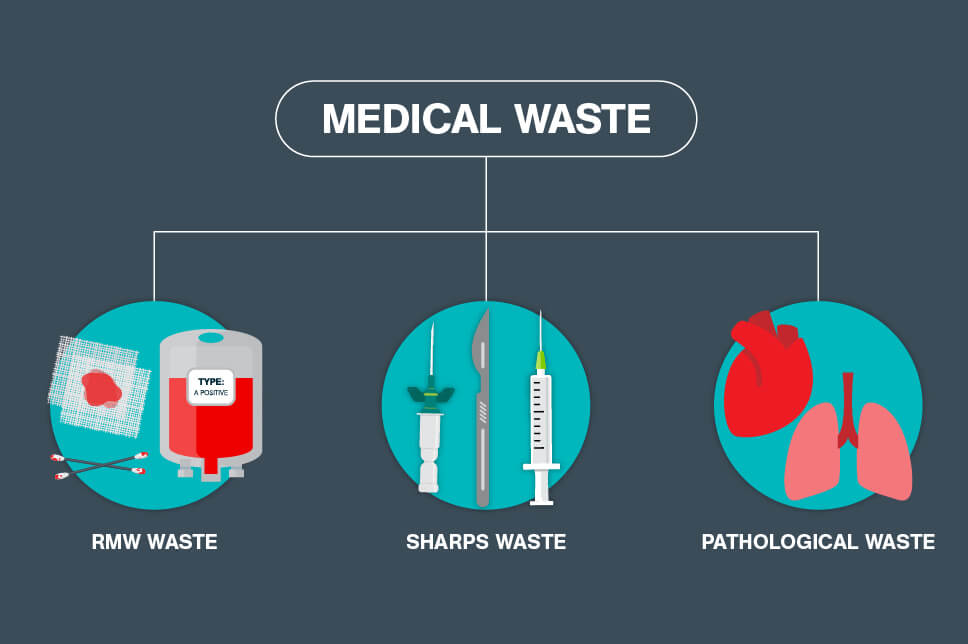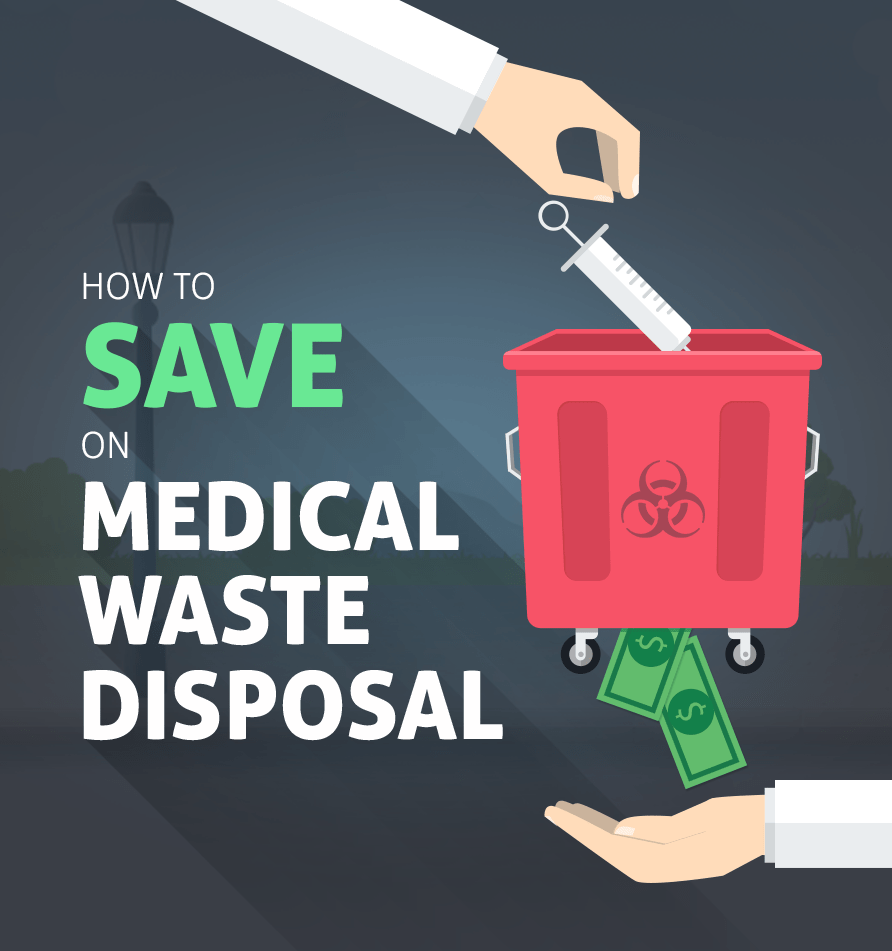Certified and Reliable Medical Waste Removal Service: Partnering for a Cleanser Future
Efficient Techniques of Medical Waste Disposal
Reliable approaches of clinical garbage disposal are vital in preserving public wellness and ecological safety. Medical waste, consisting of sharps, pathological waste, and pharmaceutical waste, should be handled and taken care of appropriately to avoid the spread of infections and protect the atmosphere. This requires adherence to rigorous policies and the implementation of expert waste monitoring methods.
Correct segregation of clinical waste, protected and secure storage, efficient therapy and sanitation methods, and environmentally-friendly disposal alternatives are essential elements of an effective medical waste disposal system. Professional waste administration solutions play a crucial duty in guaranteeing compliance with regulations and minimizing the dangers linked with inappropriate disposal. By using these methods, healthcare facilities can add to a more secure and cleaner setting while protecting the health of the area.
Correct Segregation of Medical Waste
Correct partition of medical waste is important for ensuring the effective and secure disposal of these possibly dangerous products. Clinical waste refers to any kind of waste produced throughout health care activities, such as hospitals, facilities, labs, and study facilities. It consists of a wide variety of products, such as used needles, syringes, infected dressings, ended or unused medications, and biological materials.
By setting apart clinical waste, medical care facilities can decrease the risk of infections, injuries, and ecological contamination. The process entails categorizing waste right into different kinds, such as sharps, infectious waste, pharmaceutical waste, and non-hazardous waste. Each type calls for particular handling, product packaging, and disposal methods to avoid exposure to health care employees, waste management workers, and the public.
To ensure correct segregation, health care centers ought to establish clear standards and provide appropriate training to team member. This includes enlightening staff members on the different waste classifications, correct product packaging techniques, and making use of ideal containers - WasteX Medical Waste Disposal. Additionally, clear signage and color-coding systems can be carried out to facilitate the identification and segregation of different waste types
Safe and Secure Storage of Medical Waste
Safe and protected storage of medical waste is critical for keeping the integrity and containment of potentially harmful products. Correct storage not only safeguards health care employees and the public from direct exposure to unsafe compounds however additionally protects against ecological contamination.
To guarantee secure storage space, medical facilities should stick to certain standards. Firstly, waste must be saved in puncture-resistant and leak-proof containers that are labeled appropriately. These containers should be snugly secured to stop any type of leakage or spills. In addition, the storage space area should be unattainable and protected to unapproved employees, lessening the risk of accidental direct exposure.
Correct segregation of clinical waste is likewise vital for safe storage space. Different kinds of waste, such as sharps, contagious materials, and pharmaceutical waste, need to be separated to avoid cross-contamination. This segregation can be attained with using color-coded containers or containers.
Routine surveillance and evaluation of the storage space area are essential to determine any kind of prospective threats or breaches. This consists of monitoring for indications of damage or damage in the containers, guaranteeing correct ventilation, and keeping track of temperature level and humidity degrees.
Effective Therapy and Sanitation Techniques

One frequently utilized therapy technique is autoclaving, which includes subjecting the waste to high-pressure heavy steam at temperatures above 121 degrees Celsius. This process efficiently kills microorganisms and destroys infectious agents, rendering the waste secure for more disposal. Another method is incineration, which involves melting the waste at heats. Incineration not just removes bacteria however also reduces the waste quantity via burning.
Chemical sanitation is an additional efficient method for dealing with clinical waste. This method involves using anti-bacterials such as chlorine substances, phenolic compounds, or hydrogen peroxide to kill or suspend microorganisms (WasteX Medical Waste Disposal). Chemical sanitation is commonly utilized for liquid waste, such as laboratory samples or physical fluids
In recent times, different treatment techniques such as microwave disinfection, irradiation, and biological treatment have additionally acquired focus. These techniques offer benefits such as reduced ecological influence and energy intake compared to typical techniques.
Environmentally-friendly Disposal Options
In the world of medical waste disposal, taking into consideration environmentally-friendly choices is vital. Health care centers produce a significant quantity of waste, consisting of contagious products, drugs, and chemicals, which can pose serious risks to human wellness and the atmosphere if not handled properly. Fortunately, there are a number of environmentally-friendly disposal alternatives available that can aid mitigate these dangers.
One such option is recycling. Reusing clinical waste involves segregating and refining particular materials for reuse or repurposing. Plastics, glass, and metal containers can be recycled, decreasing the need for brand-new products and minimizing the amount of waste sent out to land fills. Additionally, some health care facilities have actually applied reusing programs for certain medical gadgets or devices, additional lowering waste generation.
This method entails transforming medical waste into power via procedures like incineration or anaerobic digestion. Anaerobic digestion, on the various other hand, breaks down natural waste in the absence of oxygen, producing biogas that can be made use of for power or warm generation.

Advantages of Expert Waste Administration Solutions
One considerable advantage of specialist waste management services is the improved performance in handling and disposing of clinical waste. By utilizing expert waste monitoring solutions, healthcare centers can make certain that all medical waste is handled and disposed of correctly, lessening the danger of contamination and the spread of conditions.
Specialist waste administration solutions use trained and skilled employees that are educated concerning the laws and standards for clinical waste disposal. They have access to specialized equipment and tools that enable them to deal with different sorts of clinical waste safely and effectively. resource These services also have well-established treatments and methods in position to make certain that waste is set apart, packaged, transferred, and disposed of in compliance with local, state, and federal laws.
Additionally, expert waste administration services can provide medical care centers with detailed waste administration services. They can use services such as waste collection, transport, therapy, and disposal, customized to the particular needs and needs of the center. This gets rid of the problem of managing waste inside, enabling medical care personnel to focus on supplying quality person care.
Verdict
In verdict, reliable methods of medical waste disposal include appropriate segregation, risk-free storage space, therapy and sanitation, and environmentally-friendly disposal alternatives. These methods guarantee the safe handling and administration of medical waste, stopping the spread of infections and securing the setting.
Clinical waste, consisting of sharps, pathological waste, and pharmaceutical waste, have to be taken care of and disposed of properly to prevent the spread of infections and safeguard the atmosphere.Appropriate segregation of medical waste, protected and safe storage, effective therapy and sanitation approaches, and environmentally-friendly disposal choices are crucial elements of an effective medical waste disposal system. The procedure entails classifying waste into different kinds, such as sharps, transmittable waste, pharmaceutical waste, and non-hazardous waste. By using expert waste management services, medical care centers can make sure that all medical waste is handled and disposed of properly, minimizing the threat of contamination and the spread of illness.
Professional waste management solutions utilize experienced and trained employees that are experienced regarding the policies and guidelines for clinical waste disposal.